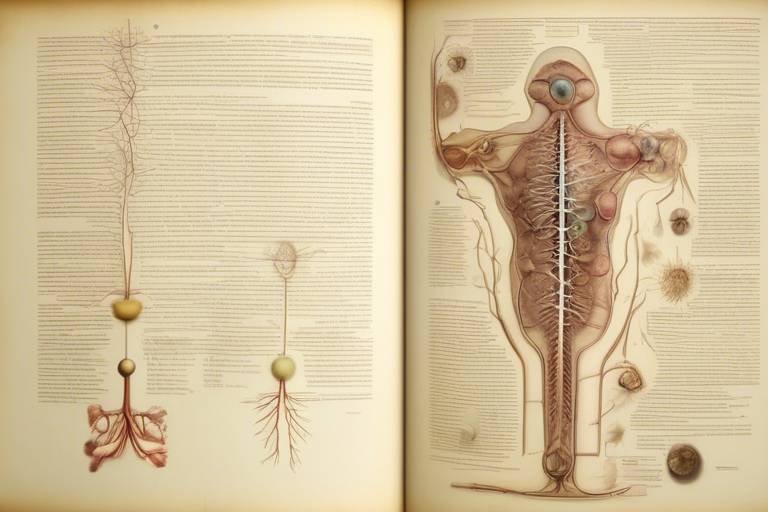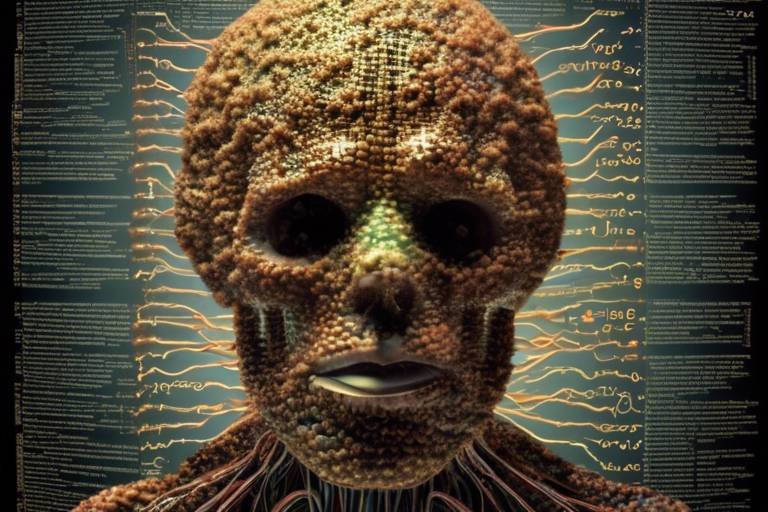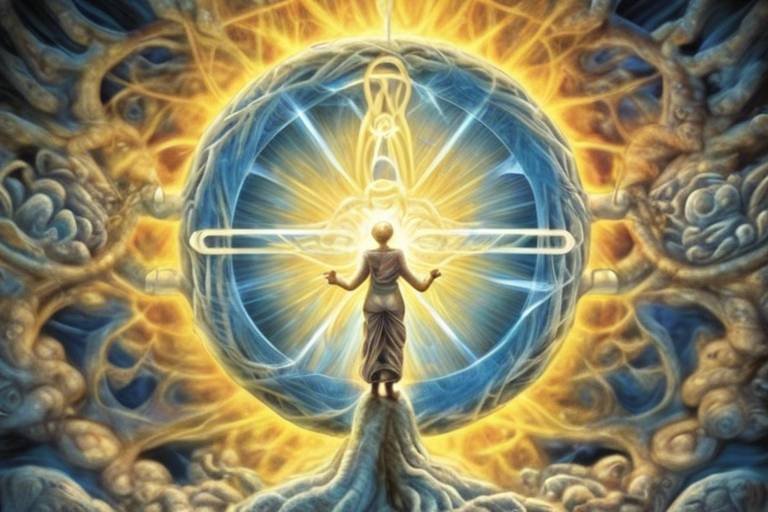Is Dualism Still Relevant in Cognitive Science?
In the ever-evolving landscape of cognitive science, the question of whether dualism remains relevant is not just a philosophical inquiry; it’s a deep dive into our understanding of consciousness and the intricate relationship between the mind and body. Dualism, the idea that the mind and body are fundamentally distinct entities, has roots that stretch back centuries, primarily associated with the renowned philosopher René Descartes. His assertion that the mind exists independently of the physical body has sparked debates that continue to resonate in contemporary discussions.
As we navigate through modern advancements in neuroscience and cognitive psychology, it becomes imperative to examine if dualism can still hold its ground against the backdrop of empirical evidence. Are we, as thinkers and researchers, clinging to outdated notions, or is there a nuanced understanding of dualism that still finds relevance today? This article aims to unravel these complexities, exploring both historical contexts and modern perspectives that shape the ongoing discourse surrounding dualism in cognitive science.
We live in a world where science and philosophy often collide, leading to exciting revelations and sometimes, perplexing contradictions. With the advent of brain imaging technologies and neuropsychological studies, the traditional dualistic view is being challenged. The question lingers: can we truly separate mental states from physical processes? Or is it time to embrace a more integrated approach that acknowledges the interplay between the two?
Throughout this exploration, we will delve into the implications of neuroscience on our understanding of consciousness, scrutinize philosophical critiques of dualism, and examine alternative theories that offer fresh perspectives on the mind-body relationship. By the end of this article, we hope to provide a comprehensive overview that not only addresses the relevance of dualism today but also sparks further curiosity and inquiry into the nature of our own consciousness.
- What is dualism? Dualism is the philosophical concept that the mind and body are two distinct entities that interact with each other.
- Who is the most notable proponent of dualism? René Descartes is often credited as the most influential philosopher advocating for dualism.
- How has neuroscience impacted the debate on dualism? Neuroscience has provided evidence suggesting that mental processes are closely tied to physical brain activity, challenging traditional dualist views.
- What are some alternatives to dualism? Alternative theories include physicalism, which posits that everything about the mind can be explained through physical processes, and functionalism, which focuses on mental states rather than their physical substrates.

The Historical Context of Dualism
To truly grasp the significance of dualism in cognitive science, we need to journey back to its philosophical roots. The term itself is often associated with the renowned French philosopher René Descartes, who, in the 17th century, famously declared, "Cogito, ergo sum" — "I think, therefore I am." This assertion laid the groundwork for a profound exploration of the relationship between the mind and the body. Descartes proposed that the mind and body are fundamentally different substances: the mind being immaterial and the body being material. This idea sparked a heated debate that continues to resonate in modern cognitive science.
Descartes' dualism can be seen as a reaction to the prevailing materialistic views of his time. He argued that while the body operates according to physical laws, the mind possesses unique qualities such as consciousness and intentionality that cannot be fully explained by physical processes. This distinction gave rise to the question: how do these two distinct substances interact? Descartes suggested a point of interaction in the pineal gland, a small gland in the brain, which he believed was the seat of the soul. This idea, although later discredited, highlights the complexities and challenges inherent in understanding the mind-body relationship.
Over the centuries, various thinkers have contributed to the dualistic discourse, each adding layers of complexity to the debate. For instance, Gottfried Wilhelm Leibniz introduced the concept of pre-established harmony, proposing that the mind and body operate in parallel without direct interaction, while Immanuel Kant questioned the very nature of reality and perception, suggesting that our understanding of the world is shaped by the interplay between our sensory experiences and cognitive faculties.
To illustrate the evolution of dualistic thought, consider the following table that summarizes key philosophers and their contributions to the dualism debate:
| Philosopher | Key Contribution |
|---|---|
| René Descartes | Proposed mind-body dualism; introduced the concept of interaction between the two. |
| Gottfried Wilhelm Leibniz | Introduced pre-established harmony; argued for parallelism between mind and body. |
| Immanuel Kant | Explored the nature of reality and perception, emphasizing the role of cognition. |
As we moved into the 19th and 20th centuries, the advent of modern science began to challenge dualistic perspectives. The rise of empirical research and advancements in fields like psychology and neuroscience provided new insights into the workings of the mind. This shift prompted many philosophers to reconsider the validity of dualism, leading to the emergence of alternative theories that sought to bridge the gap between the mind and body.
In summary, the historical context of dualism reveals a rich tapestry of philosophical inquiry, with each thinker contributing to our understanding of the mind-body relationship. As we delve deeper into contemporary debates, it becomes evident that the legacy of dualism still influences cognitive science, even as new theories and evidence challenge its foundational premises.

Modern Perspectives on Dualism
In today's rapidly evolving landscape of cognitive science, the relevance of dualism is being scrutinized more than ever. Modern philosophers and cognitive scientists are engaging in a lively debate about whether the traditional dualistic view—that the mind and body are distinct entities—holds any water in light of contemporary scientific advancements. It's fascinating to see how thinkers are wrestling with this age-old question, especially when we consider the implications of neuroscience, psychology, and artificial intelligence.
Many contemporary philosophers argue that dualism, while historically significant, may not adequately explain the intricate workings of the mind. They suggest that as we delve deeper into the neuroscientific realm, the line separating mind from body becomes increasingly blurred. For instance, recent studies have shown that mental states can often be traced back to specific neural activities. This evidence leads many to question whether the mind can truly be considered a separate entity, or if it is simply an emergent property of complex physical processes.
Moreover, the rise of functionalism—a theory that emphasizes the roles of mental states rather than their physical substrates—provides a compelling alternative to dualistic thinking. Functionalists argue that what truly matters is not the substance of the mind but its functions and interactions with the environment. This perspective shifts the focus from a strict separation to a more integrated view of cognitive processes, suggesting that mental states are best understood in terms of their roles within a system.
To illustrate this shift in perspective, consider the following table, which contrasts dualism with modern alternatives like physicalism and functionalism:
| Theory | Key Features | Implications |
|---|---|---|
| Dualism | Mind and body are separate entities | Challenges in explaining mental phenomena |
| Physicalism | Mind is entirely a product of physical processes | Unified view of cognitive science |
| Functionalism | Mental states defined by their functions | Focus on roles rather than substances |
As we navigate through these modern perspectives, it's crucial to ask: What does this mean for our understanding of consciousness? The implications are profound, suggesting that rather than viewing the mind as an isolated entity, we should consider it as part of a larger, interconnected system. This integrated approach not only aligns with current scientific findings but also opens the door to new ways of understanding human cognition and consciousness.
In conclusion, while dualism has played a pivotal role in shaping the discourse surrounding the mind-body relationship, modern perspectives are challenging its relevance. As we continue to explore the depths of cognitive science, it becomes increasingly clear that a more nuanced understanding—embracing the complexities of both physical and mental phenomena—is essential for advancing our knowledge of the human experience.
- What is dualism? Dualism is the philosophical view that the mind and body are distinct and separable entities.
- Why is dualism considered outdated by some? Many argue that advancements in neuroscience suggest that mental states are closely tied to physical processes, challenging the separation proposed by dualism.
- What are the alternatives to dualism? Alternatives include physicalism, which posits that everything about the mind can be explained in physical terms, and functionalism, which focuses on the roles of mental states.
- How does neuroscience impact the dualism debate? Neuroscience provides evidence that often links mental phenomena to brain activity, prompting a reevaluation of the dualistic perspective.

Neuroscience and Dualism
Neuroscience has become a pivotal player in the ongoing debate surrounding dualism, a philosophical stance that asserts the separation of mind and body. As we delve into the intricate workings of the brain, a fascinating picture emerges, one that challenges the traditional dualistic view. The remarkable advancements in neuroimaging and brain mapping technologies allow researchers to observe the brain in real-time, providing insights into how mental processes are closely linked to physical states. This evidence raises critical questions: Can we truly separate the mind from the body, or are they two sides of the same coin?
To illustrate this, consider the case of patients with brain injuries. Neuroscientists have documented instances where damage to specific areas of the brain resulted in profound changes in personality, memory, and even emotional responses. These findings suggest that our thoughts, feelings, and consciousness are not merely abstract entities floating independently of our physical selves but are deeply rooted in our biological makeup. In other words, the mind is not an ethereal substance; it is intricately woven into the fabric of our neural architecture.
Furthermore, the phenomenon of neuroplasticity—the brain's ability to reorganize itself by forming new neural connections—adds another layer to this discussion. It demonstrates that our mental states can influence our physical brain structure, further blurring the lines between mind and body. This relationship can be summarized as follows:
| Aspect | Dualism Perspective | Neuroscientific Perspective |
|---|---|---|
| Mind-Body Connection | Separate entities | Interconnected systems |
| Impact of Brain Damage | Minimal effect on mind | Significant changes in mental function |
| Neuroplasticity | Static mind | Dynamic interaction between mind and brain |
In light of these findings, many cognitive scientists are reevaluating dualism's relevance in contemporary discourse. While dualism has historical significance, the evidence from neuroscience increasingly supports a more integrated approach to understanding consciousness and cognition. The implications of these insights are profound, suggesting that our understanding of the mind must evolve in tandem with our understanding of the brain.
Ultimately, the relationship between neuroscience and dualism invites us to reconsider our preconceived notions about the mind-body connection. As we continue to unravel the mysteries of the brain, it becomes increasingly clear that the dualistic perspective may not adequately capture the complexities of human experience. Instead, embracing a more holistic view could lead to richer insights into the nature of consciousness and the essence of what it means to be human.
- What is dualism? Dualism is a philosophical concept that posits the mind and body as two distinct entities.
- How does neuroscience challenge dualism? Neuroscience provides evidence that mental processes are closely tied to physical brain states, suggesting a more integrated relationship.
- What is neuroplasticity? Neuroplasticity refers to the brain's ability to reorganize itself by forming new neural connections throughout life.
- Are there alternatives to dualism? Yes, theories such as physicalism and functionalism offer different frameworks for understanding the mind-body relationship.

Case Studies in Neuroscience
When we dive into the fascinating world of neuroscience, it's impossible to ignore the powerful case studies that have emerged over the years, each shedding light on the intricate relationship between the mind and body. One such study that stands out is the case of Phineas Gage, a railroad construction foreman who survived a severe brain injury in 1848. A steel rod accidentally pierced through his skull, damaging his frontal lobes. Remarkably, Gage lived for many years after the incident, but his personality underwent a dramatic transformation. This case is often cited as a pivotal moment in understanding how specific brain regions are linked to personality and decision-making, challenging the dualistic view that the mind operates independently of the physical brain.
Another compelling case is that of patients with split-brain syndrome. These individuals have had their corpus callosum, the structure connecting the two hemispheres of the brain, severed to alleviate severe epilepsy. Research on these patients has revealed that each hemisphere can operate independently, leading to fascinating insights into how different parts of the brain contribute to consciousness and cognitive functions. For instance, when a split-brain patient is shown an object in their right visual field, they can verbally identify it, as the information is processed by the left hemisphere, which is responsible for language. However, if the object is shown in the left visual field, the patient cannot name it, although they can still draw it with their left hand, controlled by the right hemisphere. This phenomenon raises profound questions about the nature of consciousness and the extent to which we can separate mental processes from physical brain functions.
Moreover, the study of neuroplasticity has brought a new dimension to the dualism debate. Neuroplasticity refers to the brain's ability to reorganize itself by forming new neural connections throughout life. This adaptability challenges the notion that the mind and body are distinct entities. For example, in rehabilitation after a stroke, patients often undergo intensive therapy to retrain the brain, demonstrating that cognitive processes can be altered and improved through physical changes in the brain. Such findings suggest that our understanding of the mind must consider the dynamic interplay between mental states and physical brain states, moving beyond a simplistic dualistic framework.
In summary, these case studies illustrate the profound impact that neuroscience has on our understanding of the mind-body relationship. They highlight the complexities involved and challenge the traditional dualistic perspective. As we continue to explore these fascinating intersections, it becomes increasingly clear that a more integrated approach is necessary to truly understand consciousness and cognitive processes.

Implications for Consciousness
The implications of neuroscience on our understanding of consciousness are profound and challenging, raising important questions about the validity of traditional dualistic perspectives. As we delve deeper into the workings of the brain, it becomes increasingly clear that consciousness may not be as separate from physical processes as dualism suggests. For instance, consider the way our thoughts, feelings, and perceptions correlate with specific neural activities. When we experience joy, sadness, or even fear, these emotional states can often be traced back to identifiable changes in brain activity. This relationship suggests that consciousness is not an ethereal entity floating above the physical body, but rather a complex interplay of biological processes.
Furthermore, the advancements in neuroimaging techniques, such as fMRI and PET scans, allow scientists to observe the brain in real-time, revealing how various cognitive tasks activate different regions. This evidence challenges the dualist notion that the mind operates independently of the body. Instead, it supports a more integrated view, where consciousness emerges from the intricate network of neurons firing in synchrony. As we gather more data, we may find ourselves questioning the very nature of consciousness and whether it can exist without its physical counterpart.
Moreover, the implications extend beyond merely understanding consciousness; they also touch upon ethical considerations in fields such as artificial intelligence and robotics. If consciousness is indeed a product of physical processes, what does that mean for machines designed to simulate human thought? Can a robot truly be conscious, or is it merely mimicking human behavior? These questions are not just academic; they have real-world implications for how we interact with technology and what we define as sentient beings.
In light of these considerations, it becomes evident that the dualistic view of consciousness may need to be reevaluated. Instead of viewing the mind and body as separate entities, a more holistic approach may be necessary, one that acknowledges the complex interdependencies that define our cognitive experiences. As we continue to explore the depths of neuroscience, we may find that the answers to understanding consciousness lie not in the separation of mind and body, but in their intricate connection.
- What is dualism in cognitive science? Dualism is the philosophical view that the mind and body are distinct entities, with the mind often seen as non-physical and separate from the physical body.
- How does neuroscience challenge dualism? Neuroscience provides evidence that mental states correlate with physical brain activity, suggesting that consciousness may not exist independently of the brain.
- What are the implications of neuroscience for understanding consciousness? It implies that consciousness may emerge from physical processes in the brain, challenging the traditional dualistic view and raising ethical questions regarding artificial intelligence.
- What are alternative theories to dualism? Alternative theories include physicalism, which posits that everything about the mind can be explained through physical processes, and functionalism, which emphasizes the roles of mental states rather than their physical substrates.

Philosophical Critiques of Dualism
The concept of dualism, which posits a distinct separation between the mind and the body, has faced a plethora of challenges from contemporary philosophers. One of the most significant critiques is that dualism fails to adequately explain the intricate relationship between mental states and physical processes. For instance, when we think about a painful experience, it is not just a mental event; it is deeply intertwined with physical sensations and neurological responses. This raises the question: how can two fundamentally different substances—mental and physical—interact in a meaningful way? This is often referred to as the interaction problem, a dilemma that has left many philosophers scratching their heads.
Moreover, critics argue that dualism does not account for the empirical evidence gathered from neuroscience. As our understanding of the brain has advanced, it has become increasingly clear that many cognitive functions can be traced back to specific neural activities. For example, studies have shown that damage to certain brain regions can lead to predictable changes in personality and behavior, suggesting that our mental processes are not as separate from our physical existence as dualism would suggest. This evidence challenges the very foundation of dualistic thought, pushing for a more integrated understanding of the mind-body relationship.
Another critique centers on the notion of explanatory power. Critics contend that dualism lacks the ability to provide a comprehensive framework for understanding consciousness. While dualism posits that the mind exists independently of the body, it struggles to explain how subjective experiences arise from non-physical substances. This is particularly problematic when considering phenomena such as emotions, thoughts, and perceptions, which seem to have a direct correlation with physical states. In essence, dualism can seem like an incomplete narrative in the grand story of cognitive science.
Additionally, many philosophers advocate for a more pragmatic approach, suggesting that dualism can lead to a form of epistemic isolation. By separating the mind from the body, dualism may inadvertently promote a disconnect between our understanding of psychological phenomena and the biological processes that underlie them. This isolation can hinder progress in cognitive science, as researchers might overlook the valuable insights that arise from studying the mind in conjunction with the body.
In light of these critiques, it is essential to consider alternative frameworks that offer a more cohesive understanding of the mind-body relationship. Philosophers have proposed various theories, such as physicalism and functionalism, which emphasize the importance of physical processes in explaining mental phenomena. These perspectives not only address the shortcomings of dualism but also align more closely with the findings of contemporary neuroscience.
In conclusion, while dualism has played a pivotal role in the history of philosophy and cognitive science, its relevance is increasingly questioned. The critiques it faces highlight the need for a more integrated approach to understanding the complexities of the mind and body. As we continue to explore the depths of consciousness and cognition, it becomes clear that a single framework may not suffice; instead, a rich tapestry of theories may be necessary to capture the full essence of human experience.
- What is dualism? Dualism is the philosophical view that the mind and body are fundamentally different substances that interact with each other.
- Who is the most famous proponent of dualism? René Descartes is often credited as the father of dualism, particularly through his famous statement, "I think, therefore I am."
- What are the main criticisms of dualism? Critics argue that dualism fails to explain the interaction between mind and body, lacks explanatory power regarding consciousness, and can lead to epistemic isolation.
- What are some alternatives to dualism? Alternatives include physicalism, which posits that everything about the mind can be explained in terms of physical processes, and functionalism, which emphasizes the roles of mental states rather than their physical substrates.

Alternative Theories to Dualism
As we dive deeper into the intricate relationship between the mind and body, it becomes clear that dualism isn't the only game in town. In fact, a variety of alternative theories have emerged, each offering unique insights into how we can understand cognition. Two of the most prominent alternatives are physicalism and functionalism. These theories challenge the traditional dualistic view by proposing that the mind is not a separate entity from the body, but rather intricately linked to it in ways that we are just beginning to understand.
Let's start with physicalism. This theory posits that everything about the mind can ultimately be explained through physical processes. Imagine the mind as a complex machine, where every thought, feeling, and experience corresponds to specific physical states in the brain. This perspective suggests that our mental states are not some ethereal substance floating above our physical being but are instead grounded in the tangible world of neurons firing and chemicals reacting. Physicalism challenges the dualistic notion that the mind exists independently of the brain, presenting a more unified view that aligns with the findings of modern neuroscience.
On the other hand, we have functionalism, which takes a slightly different approach. Instead of focusing on the physical substrates of mental states, functionalism emphasizes the roles those states play in our overall cognitive processes. Think of it like a software program running on different hardware. Whether it’s a Windows PC, a Mac, or even a smartphone, the software remains the same, but the underlying hardware varies. In this sense, functionalism allows for the possibility that mental states can be realized in multiple ways, not just through human biology. This perspective opens the door to understanding cognition in a broader context, including artificial intelligence and other non-biological systems.
Both physicalism and functionalism present compelling arguments against dualism, highlighting the need for a more integrated approach to studying cognitive processes. However, they are not without their critiques. Some argue that physicalism may oversimplify the rich tapestry of human experience by reducing it to mere biological functions. Meanwhile, functionalism has faced challenges in explaining the qualitative aspects of consciousness—what it feels like to experience something, often referred to as the "hard problem" of consciousness.
To illustrate these theories further, let’s take a look at the following table that summarizes the key differences between physicalism and functionalism:
| Theory | Core Idea | Strengths | Critiques |
|---|---|---|---|
| Physicalism | Everything about the mind can be explained through physical processes. | Aligns with neuroscience; offers a unified view of mind and body. | May oversimplify mental phenomena. |
| Functionalism | Mental states are defined by their roles in cognitive processes. | Allows for multiple realizations of mental states; applicable to AI. | Struggles with explaining qualitative experiences. |
In conclusion, while dualism has historically dominated discussions about the mind-body relationship, alternative theories like physicalism and functionalism are reshaping our understanding. They invite us to reconsider the complexities of cognition and challenge us to explore new avenues of research. As we continue to unravel the mysteries of the mind, it's essential to remain open to these alternative perspectives, which may ultimately lead us to a more comprehensive understanding of what it means to be human.
- What is dualism? Dualism is the philosophical concept that the mind and body are distinct entities, with the mind existing independently of the physical body.
- How does physicalism differ from dualism? Physicalism asserts that everything about the mind can be explained through physical processes, whereas dualism maintains that the mind and body are separate.
- What is functionalism? Functionalism is a theory that focuses on the roles of mental states in cognitive processes rather than their physical substrates.
- Can artificial intelligence have consciousness? Functionalism suggests that if AI can replicate the functions of mental states, it could theoretically possess a form of consciousness, although this remains a topic of debate.

Physicalism Explained
Physicalism is a philosophical viewpoint that asserts that everything about the mind can ultimately be explained through physical processes. In simpler terms, it suggests that our thoughts, feelings, and consciousness are all products of physical interactions within the brain and body. This perspective stands in stark contrast to dualism, which posits that the mind and body are fundamentally different entities. To understand physicalism better, consider it as a lens through which we can view cognitive science, where every mental phenomenon has a corresponding physical basis.
One of the key advantages of physicalism is its alignment with the advancements in neuroscience. As researchers delve deeper into the brain's workings, they uncover a wealth of information that links mental states to neural activities. For instance, studies have shown that specific brain regions are activated during particular thoughts or emotions. This correlation suggests that our mental experiences are not separate from our biological processes but are instead deeply intertwined.
Here are some core principles of physicalism:
- Unity of Science: Physicalism posits that all scientific disciplines, including psychology and cognitive science, should ultimately be reducible to physical sciences like biology and physics.
- Mind-Brain Identity: This principle suggests that mental states are identical to brain states, meaning that every thought or feeling corresponds to a specific physical state in the brain.
- Elimination of Dualism: Physicalism challenges the dualistic view by arguing that the mind is not a separate entity but rather a function of the brain's physical processes.
Critics of physicalism often argue that it cannot fully account for the subjective quality of experiences—what philosophers call "qualia." For example, how do we explain the unique experience of seeing the color red or feeling joy? These subjective experiences seem to resist reduction to mere physical descriptions. However, proponents of physicalism counter that as our understanding of the brain deepens, we may eventually find ways to explain these experiences in purely physical terms.
In summary, physicalism offers a robust framework for understanding the mind-body relationship. It encourages a scientific approach to studying cognitive processes, urging us to look beyond the metaphysical debates of dualism. As cognitive science continues to evolve, physicalism may provide the key to unlocking the mysteries of consciousness and cognition, making it a vital perspective in contemporary discussions about the mind.

Functionalism's Role
Functionalism offers a fascinating lens through which we can examine the intricate relationship between the mind and body, diverging from traditional dualistic frameworks. Instead of focusing solely on the physical or the mental, functionalism emphasizes the roles that mental states play in our overall cognitive processes. Imagine a computer: it's not just about the hardware (the physical components) or the software (the programs running on it); it's about how they interact and function together to produce results. Similarly, functionalism posits that mental states are defined by their functional roles rather than their physical makeup. This perspective allows for a more dynamic understanding of cognition, one that acknowledges the complexity of mental processes without being confined to a rigid dualistic view.
One of the most compelling aspects of functionalism is its ability to accommodate the vast array of mental experiences we encounter. For instance, consider emotions. While a dualist might argue that emotions are separate from physical states, functionalism suggests that emotions can be understood in terms of their roles in our behavior and interactions. They influence our decisions, shape our responses to the world, and even guide our social interactions. By focusing on the functions of these mental states, functionalism provides a framework that is not only inclusive but also adaptable to new findings in cognitive science and neuroscience.
Moreover, functionalism aligns well with the advancements in technology and artificial intelligence (AI). As we develop more sophisticated AI systems, the question arises: can machines exhibit mental states? Functionalism suggests that if a machine can perform the same functions as a human mind—such as reasoning, problem-solving, and emotional responses—then it can be said to possess mental states, regardless of its physical structure. This opens up exciting possibilities for understanding cognition and consciousness in both humans and machines, further blurring the lines that dualism attempts to maintain.
However, functionalism is not without its challenges. Critics argue that focusing solely on functions might overlook the subjective experience of consciousness, an aspect that dualism often emphasizes. To address this, some functionalists propose a more integrated approach that considers both the functional roles of mental states and the qualitative experiences associated with them. This dual focus could pave the way for a more comprehensive understanding of cognition that honors the richness of human experience while still embracing the scientific rigor that functionalism champions.
In summary, functionalism plays a crucial role in contemporary cognitive science by providing a flexible and inclusive framework that emphasizes the importance of mental states and their functions. As we continue to explore the complexities of the mind-body relationship, functionalism stands out as a promising theory that encourages dialogue between philosophy and science, ultimately enriching our understanding of what it means to think, feel, and be conscious.

The Future of Dualism in Cognitive Science
The future of dualism in cognitive science is a topic that stirs up quite a bit of debate among scholars, philosophers, and scientists alike. As we dive deeper into the intricacies of the mind-body relationship, it's becoming increasingly clear that dualism may not hold the same weight it once did. Yet, it still raises compelling questions that challenge our understanding of consciousness and cognition. So, what does the future hold for this age-old concept?
One of the most significant factors influencing the future of dualism is the rapid advancement of neuroscience. With each passing year, we uncover more about how the brain functions, and it seems that the evidence is leaning toward a more integrated view of mind and body. For instance, consider the myriad of studies linking brain activity to cognitive processes. These findings suggest that our thoughts, emotions, and even our consciousness are deeply rooted in physical brain states, which poses a challenge to the dualistic notion of a separate mind and body.
However, it's essential to recognize that dualism isn't merely a relic of philosophical history; it still sparks valuable discussions about the nature of existence. Many contemporary thinkers argue that while neuroscience provides crucial insights, it doesn't fully encapsulate the richness of human experience. This perspective opens the door to a future where dualism might evolve rather than disappear. Perhaps we could see a hybrid model emerge, one that incorporates the strengths of dualism while embracing the findings of modern science.
Moreover, as artificial intelligence and machine learning continue to advance, questions about consciousness and cognition are becoming even more complex. Can machines possess a form of consciousness? If so, does that challenge dualistic thinking? These inquiries could lead to a renaissance of dualistic thought, pushing us to redefine what we consider "mind" and "body" in an increasingly digital world.
In light of these developments, the future of dualism could unfold in several ways:
- Integration with Neuroscience: Dualism may adapt to incorporate findings from neuroscience, leading to a more nuanced understanding of the mind-body relationship.
- Philosophical Evolution: New philosophical frameworks could emerge that blend dualistic and physicalist perspectives, offering fresh insights into consciousness.
- Technological Impact: Advances in AI and robotics may prompt a reevaluation of what it means to be conscious, potentially revitalizing dualistic theories.
In conclusion, while dualism faces significant challenges from modern scientific advancements, it also has the potential to evolve. The ongoing dialogue between neuroscience, philosophy, and technology will undoubtedly shape our understanding of the mind-body relationship in the years to come. As we continue to explore these complex questions, dualism may not only remain relevant but could also inspire new theories that enrich the field of cognitive science.
1. What is dualism?
Dualism is the philosophical concept that posits the existence of two distinct entities: the mind and the body. It suggests that mental phenomena are, in some respects, non-physical and cannot be fully explained by physical processes alone.
2. Why is dualism still relevant today?
Despite advancements in neuroscience, dualism remains relevant as it raises essential questions about consciousness and the subjective experience, prompting ongoing discussions in philosophy and cognitive science.
3. How does neuroscience challenge dualism?
Neuroscience provides evidence that mental states are closely linked to brain activity, suggesting that cognitive processes may be entirely physical, thereby challenging the dualistic separation of mind and body.
4. Can dualism evolve in the face of new scientific findings?
Yes, dualism can evolve by integrating insights from neuroscience and adapting to new philosophical frameworks. This hybrid approach may lead to a richer understanding of the mind-body relationship.
Frequently Asked Questions
- What is dualism in cognitive science?
Dualism is the philosophical concept that posits the existence of two distinct entities: the mind and the body. In cognitive science, it refers to the debate about how these two aspects interact and influence each other, particularly in understanding consciousness and mental processes.
- How did historical figures influence the concept of dualism?
Historical philosophers, especially René Descartes, played a pivotal role in shaping dualism. Descartes famously argued for the separation of mind and body, which laid the groundwork for ongoing discussions in cognitive science about the relationship between mental and physical states.
- What are the main criticisms of dualism?
Critics argue that dualism fails to adequately explain how mental phenomena arise from physical processes. They contend that it complicates our understanding of cognition and consciousness, suggesting instead that a more integrated approach, like physicalism, might be more valid.
- How does neuroscience challenge dualism?
Neuroscience provides empirical evidence that often contradicts the dualistic view by demonstrating how brain activity correlates with mental states. This challenges the notion of a clear separation between mind and body, prompting a reevaluation of dualistic perspectives.
- What alternative theories exist to dualism?
Alternative theories such as physicalism and functionalism offer different frameworks. Physicalism posits that all mental states can be explained by physical processes, while functionalism emphasizes the roles of mental states over their physical substrates, providing a more cohesive understanding of cognition.
- Is dualism still relevant in modern cognitive science?
While dualism has been challenged, it remains a topic of debate. As cognitive science evolves, the relevance of dualism continues to be examined in light of new neuroscientific findings and philosophical arguments, keeping the discussion alive and dynamic.
- What implications does dualism have for understanding consciousness?
The implications of dualism for consciousness are profound. It raises questions about the nature of subjective experience and whether it can truly be separated from physical processes, suggesting that a more integrated view may be necessary to fully grasp the complexities of consciousness.



















